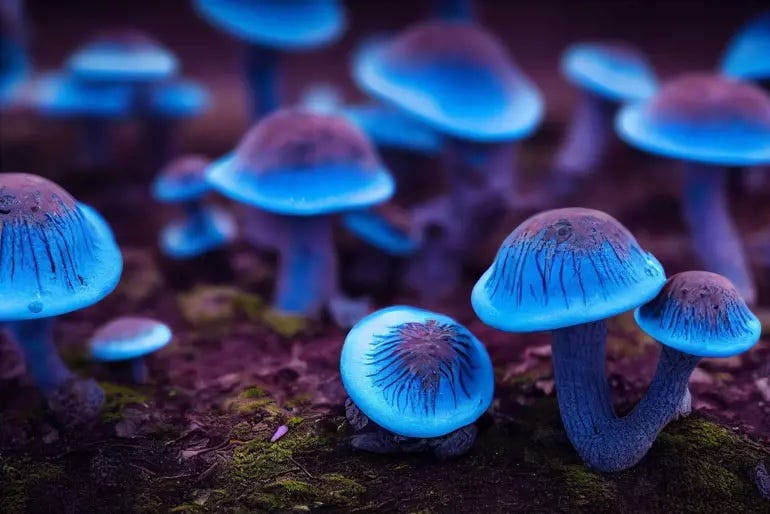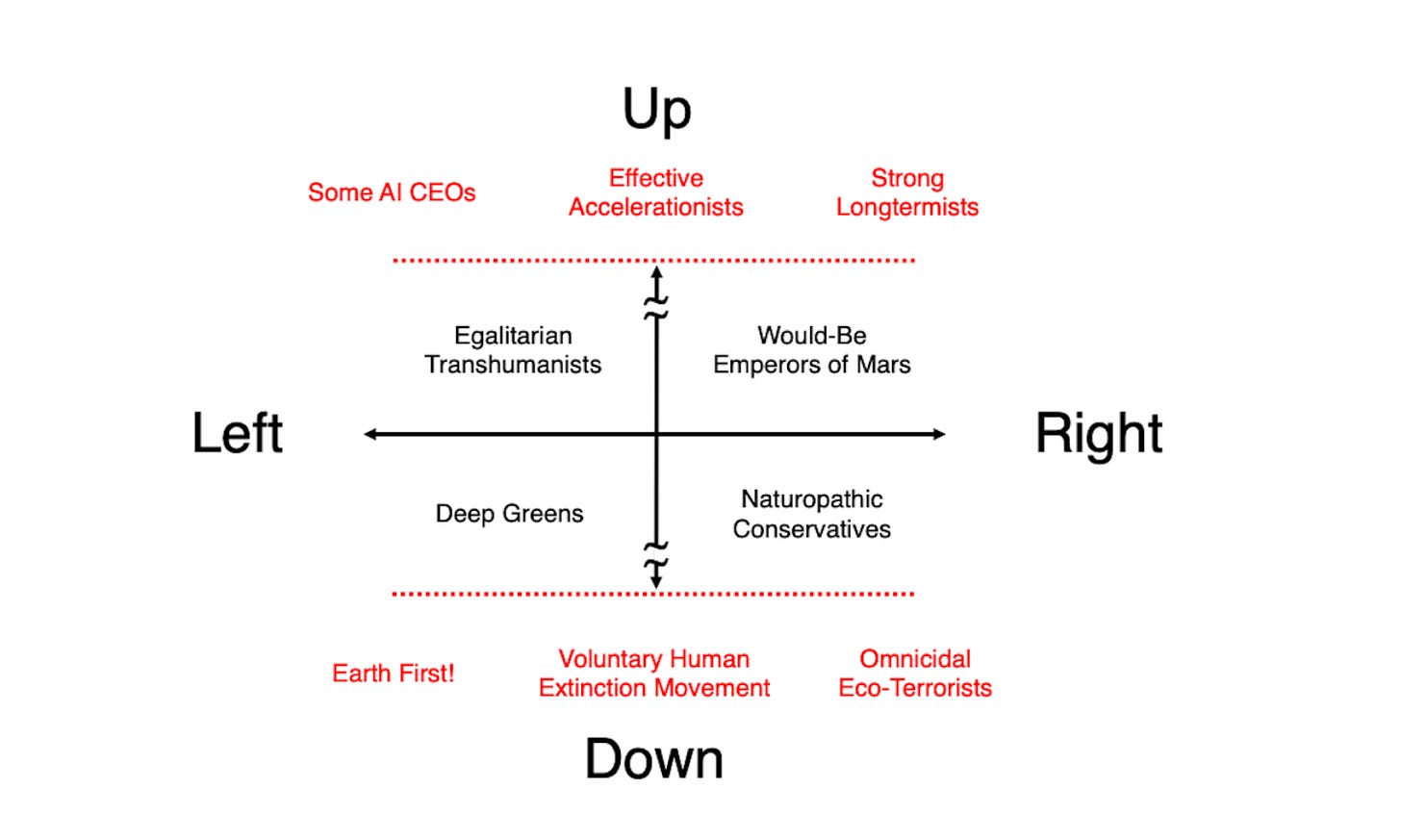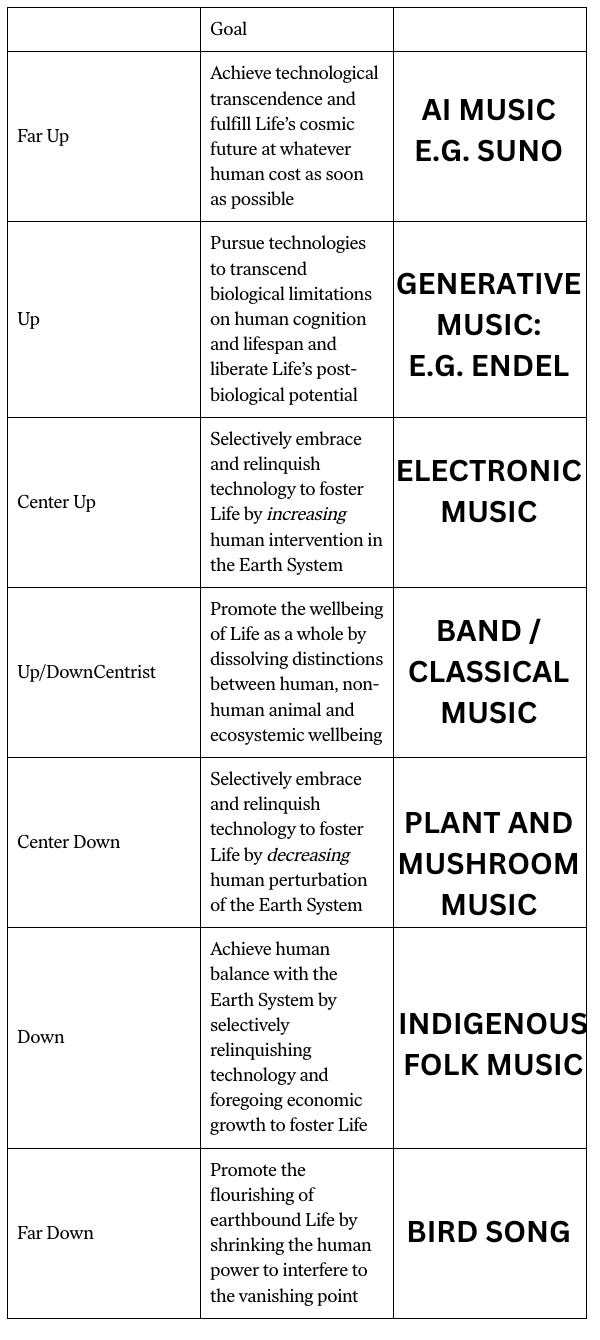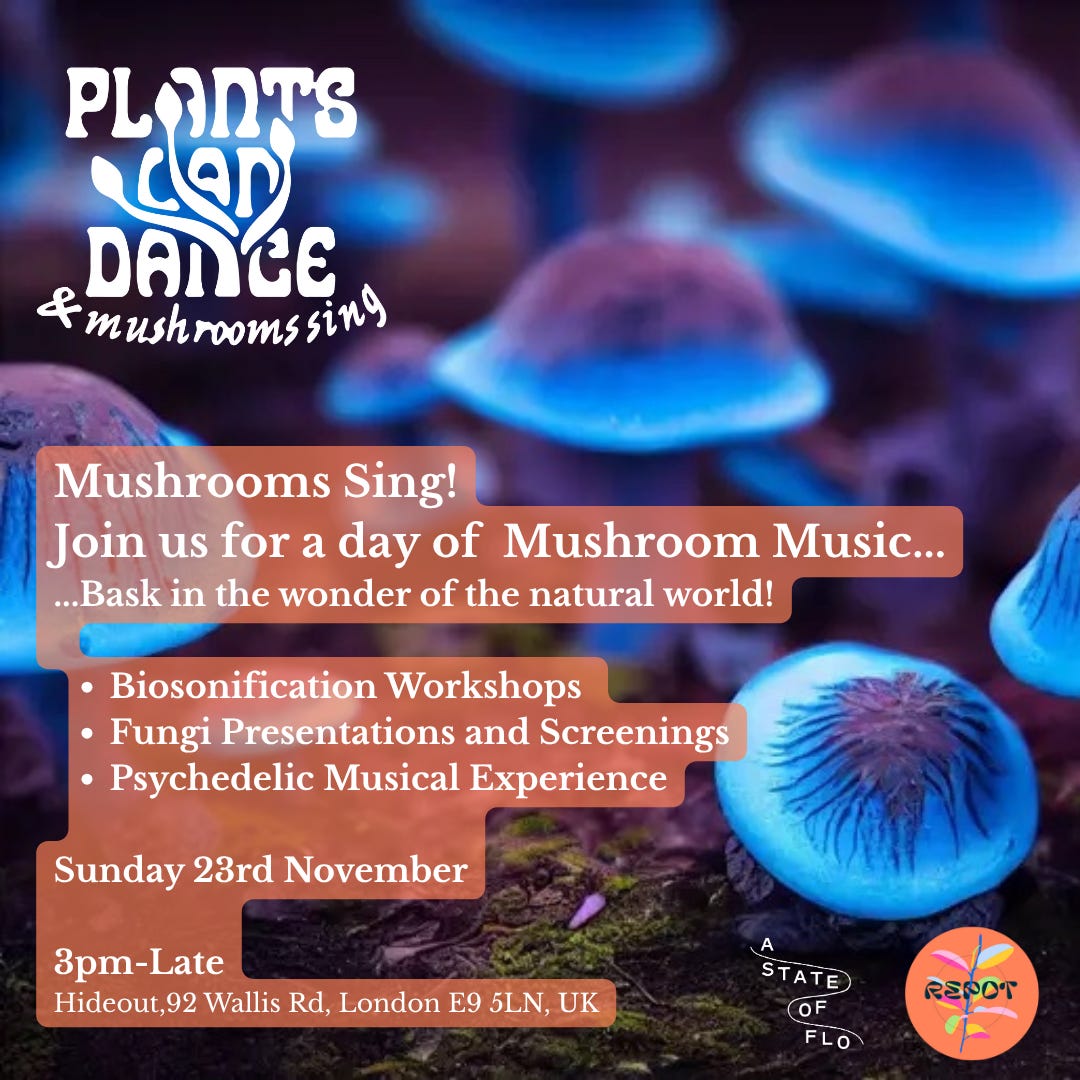Non-Human Music
The politics of Up-Wing versus Down-Wing, technology versus environment, defining Life, new definitions of Music, AI Music, bio-Music, Mushroom Music, Plants Can Dance.
Up Wing and Down Wing
A fascinating article I read recently was by Dan Kimmer on Noema Magazine, entitled a ‘New Way of Defining the Political Compass’. In the article, he challenges the traditional right wing/left wing political dichotomy, which has been in place since the French Revolution as soon-to-be obsolete, replaced by a new political divide. He defines this as ‘Up-wing’ versus ‘Down-Wing’ or ‘Technologists’ versus ‘Environmentalists’.
This tension between technologists and environmentalists cuts across traditional political boundaries, splitting the MAGA movement into “tech” and “green” factions and increasingly dividing the left into its own techno-solutionist and ecological camps.
The Up-Wing are the Technologists, seeking utopian solutions which create a sustainable future for (at least some of) humanity. On the right wing side of the up-wing, you have the Elon Musk and Peter Thiel types, determined to terra-form a new planet and create new forms of trans-human intelligence as a means of solving all the problems we have on this planet, from climate change to social welfare.
On the left wing side, you have the dreamers in Silicone Valley, developing cutting-edge technology that they hope will find solutions that are more sympathetic to the challenges our growing global populations are faced with.
On the other side, you have the ‘Down-Wing’ - the Environmentalists who believe that humans are fundamentally problematic, that our technological advancements have led to nothing but the destruction of the planet and will continue to do so until the point of no return.
For the ‘Downers’, the only solution is a return to more traditional and slower ways of living that were more prevalent in the past. On the right of this divide you have the conservative environmentalist - traditional landowner types (perhaps King Charles could be counted as one) that are somewhat repulsed by a lot of what modernity has to offer.
On the left you have the the eco-warrior types where human nature is largely a force for wrong-doing, lacks emphathy with the planet and has lost all respect for mother nature’s teachings. To them, for any balance to be restored we must re-learn everything from indigenous wisdom, rid ourselves of technology and go back to some kind of subsistence and localised way of living like that of our ancestors.
Definition of Life
Kimmer explains that the Up/Down split is based on how one defines ‘Life’ itself:
One camp views Life primarily as an information process to expand and enhance, while the other conceives of Life chiefly as a complex system to maintain and balance. These contrasting perspectives inspire rival political visions: one gazing upward toward Life’s cosmic conquests and the other downward toward Life’s planetary entanglements. They demand a new political language and orientation — neither left nor right — that I propose can best be captured by the contrast between a technological “Up” and an ecological “Down.”
For the up-wing, the entropic nature of the planet can be solved by our endeavours to transcend the restrictions of the human body - of short life expectancy, limited capacity for memory and cognition and the physical limitations of the body as a vessel etc. We can transcend these limitations by embracing technology for the advancement of the human race - and as such the vision can be described as ‘trans-human’.
On the other hand, the down-wing vision is far more centred around mother nature: the need for us to integrate with the living ecosystem around us. Perhaps this is best defined by James Lovelock’s ‘Gaia Hypothesis’, where the earth and everything in it is one massive super-organism that survives in homeostasis. To Lovelock and others, the quest is to achieve some level of ‘post-humanism’.
I think this is a fascinating way to view the current political landscape and one where I’m not entirely sure where I fit. I use and welcome human-made technology across most things I do but equally have a deep and growing affinity with the natural world: As I’ve explained before, I view my mission is to connect the electronic music world with the natural one. For this reason I suppose I’m somewhat of an up-wing / down-wing centrist! Don’t hate me…
The Two Sides of Non-human Music
So what does this all have to do with music?
Cast Kimmer’s political framing through the lens of music, we find a similar dichotomy that I believe fundamentally alters the way we will define music in the near-future.
Closely aligned with the Up-Wing side, we have the march of AI music systems - the ability for new songs to be created within seconds by a machine (which has been trained on over 100 years of recorded human music) and used to serve any desired human need - from sleep sounds, love songs, work out songs to anything you can think of.
The solution here is for purely functional gains, immediately replacing the time, skill, effort and craft it takes ordinary musicians to make songs with AI music designed for a specific purpose. I’m thinking here of AI Music start up Suno, where the founder proclaimed that ‘people don’t enjoy making music’. Urgh! But the worry is that the joy one gains from music as art is lost to music as pure commodity.
On the Down-Wing side, followers of A State Of Flo will know that we’ve being experimenting with non-human music created in collaboration with living organisms from the natural world, using bio-electricity or field recordings to generate musical compositions that challenge and encourage the listener to tune in to nature more deeply.
Listening to nature’s music in this way allows you to hear things in a non-human way - the common human timing and rhythmic centre is no longer regulated to a constant beat, the patterns that one finds in popular music are no longer available to latch onto and predict. You hear natures-timing, natures notes and a version of nature’s voice - with the realisation that you are no longer the protagonist, you must surrender (in the same sense that Brian Eno talked about surrendering to Ambient Music as well as religion, drugs, sex etc).
Of course, this form of composition is not deepest Down-Wing in the sense that Kimmer describes - the use of technology is key, using human-made means of processing the stream of data from nature into a sequence of sounds that are audible and based around human rules in terms of frequency i.e. scales, tunings etc.
However, as I do more of these performances, I’ve figured out how to reduce my human self as much as possible - creating a musical system that is driven by the organism, be it a plant or mushroom: all I do is to keep it fed with water and light!
Further down-wing, you will find nature’s own ‘music’ - the biophony - and perhaps more indigenous/folk music traditions made by humans in service of the planet.
Taking Kimmer’s descriptions of each category on the Up-Down Wing scale, I started to think of what the musical equivalent might be:
After I started writing this I realised this is a far bigger topic than perhaps I gave it credit for. So I’ll pause here and welcome any comments and thoughts - do you like the framing? do you agree / disagree? Or have I massively missed the mark?
Plants Can Dance (and Mushrooms Sing) - 23rd November
Whilst we’re on the topic of non-human music, I’m happy to announce the next Plants Can Dance (and Mushrooms Sing) event in London on 23rd November.
We’ll be exploring the bioelectrical signals from all types of fungi (and some plants) and how we can make music from them as part of our biosonification workshop, where everyone can get involved.
We’ll be hearing from fungi experts such as fungi photographer Max Mudie and artist Jananicole from the All Things Fungi festival, Simon Bateman from Flow Brew functional mushrooms, and also James B Close, a researcher from Imperial College’s Centre For Psychedelic Research, and a screening of ‘The Lonely Mushroom’ short film.
We’ll conclude with live mushroom music and a psychedelic DJ set from Brian d’Souza, featuring music curated for one of Imperial’s psilocybin trials.
If you are interested in the wonder of fungi, mycelium, mushrooms and how they power our world and a fan of ambient music, modular synthesis and connecting to the natural world through music, this event is not to be missed!
Line up so far:
Max Mudie (All Things Fungi) - photography showcase/talk
James B Close (Centre For Psychedelic Research) - talk on psychedelics
Jananicole (All Things Fungi) - art showcase/talk
Simon Bateman (Flow Brew) - functional mushrooms
Screening of ‘The Lonely Mushroom’ short film
Brian d’Souza (A State Of Flo)
Lamine (Repot)







Figure you'd appreciate this:
https://www.youtube.com/watch?v=NbP2DgDp890